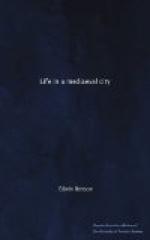Money was measured in marks, shillings, and pence. Of the current coins those in gold were called the angel, half-angel, the noble, half-noble, and quarter-noble; in silver there were the groat, half-groat, the penny, and half-penny. The local branch of the royal Mint was housed within the Castle. The building containing it was rebuilt in accordance with an order of 1423. The coins from this mint, which was at work during a large part of the fifteenth century, bore distinctive marks to show the place of minting. Silver coins bore the inscription CIVITAS EBORACI. The archbishops continued to use their privilege of coining money.
The following extracts, interesting for the substance and the literary form, are taken from the city records as published by the Surtees Society, vols. 120, 125, “The York Memorandum Book.”
From the ordinances of the Pewterers, 1416.
“Ordinaciones pewderariorum.
“Ceux sont les articles de lez pewderers de Lounders, les queux les genz de mesme lartifice dyceste citee Deverwyk ount agrees pur agarder et ordeiner entre eux par deux ans passez, devant Johan Moreton, maire.”
Others of the earlier ordinances are in Anglo-French; many are in Latin. Later ordinances are in English as in the case of those of the Carpenters, 1482, of which the following are the opening paragraphs:—
“In the honour of God, and for the weile of this full honourabill cite of York, and of the carpenters inhabit in the same at the special instaunce and praier of” ... (here follows a list of names) ... “carpenters of this full nobill cite, ar ordeyned the xxij^ti day of Novembyr in the xxij^ti yere of the reing of king Edward the iv. in the secund tym of the mairalte of the ryght honorabill Richard York mair of the said cite, by the authorite of the holl counsell of the said full honourable cite, for ewyr to be kept thez ordinaunces filluyg,
“Furst, for asmoch as here afore ther hath beyn of old tym a broderhode had and usyd emong the occupacion and craft above said, the wich of long continuaunce have usid, and as yit yerly usis to fynd of thar propir costes a lyght of diwyrs torchis in the fest of Corpus Christi day, or of the morn aftir, in the honour and worship of God and all saintes, and to go in procession with the same torchis with the blessid sacrament from the abbey foundyd of the Holy Trenite in Mykylgate in the said cite on to the cathedrall chyrch of Saint Petir in the same cite; and also have done and usyd diwyrs odir right full good and honourabill deides, as her aftir it shall more playnly apeir. It is ordenyd and esyablyshid be the said mair, aldermen, and all the holl counsell of the said full nobill cite, be the consent and assent of all tham of the said occupacion in the said cite, that the said fraternite and bredirhode shalbe here after for ewyr kept and continend as it has beyn in tymis passid, and that every brodir thar of shall pay yerly for the sustentacion thar of vjd, that is to say, at every halff yer iij^d, providyng allway that every man of the said occupacion within the said cite shalnot be compellid ne boundeyn to be of the said fraternite ne brodirhood, ne noyn to be thar of bot soch as will of thar free will.”




